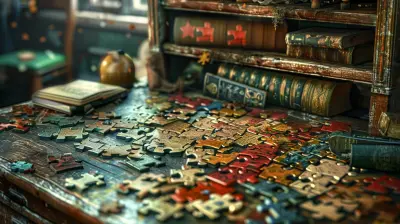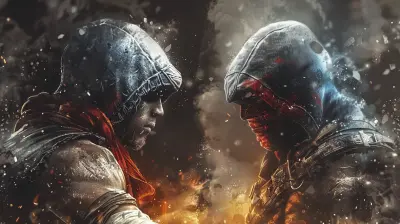10 April 2025
Game awards are like the Oscars of the gaming world—a glitzy celebration of creativity, innovation, and hard work. It’s a moment for developers to bask in the limelight, players to cheer for their favorites, and, of course, for the press to go wild with coverage. But let’s take a step back for a moment. Beyond the hype, applause, and shiny trophies, does winning a game award actually have a measurable impact on a game's sales? Or is it just about the bragging rights? Let’s dig in and find out.
The Power of Prestige: Game Awards as a Seal of Approval
When a game wins an award, it’s like getting a golden stamp of approval. Think about it—if you’re scrolling through a sea of games and spot one with a “Game of the Year” (GOTY) badge slapped on it, wouldn’t you pause for a second? It gives off an immediate vibe of quality, like finding a restaurant with a Michelin star. People naturally trust picks that experts and critics have deemed the best of the best.For many players, an award validates a game. Even those who might not usually play a specific genre could be tempted to give it a shot. After all, if it’s good enough to win an award, surely it’s worth their time and money, right? And that’s where the initial sales boost often kicks in. Suddenly, a niche title might find itself in the hands of an entirely new audience.
Awards and Sales: The Correlation (and Sometimes, the Lack Thereof)
So, does winning an award directly translate to more sales? Well, yes and no—it’s not always a straightforward equation. Let’s break it down.The “Award Buzz” Effect
Imagine this: a game wins Game of the Year at The Game Awards, one of the most prestigious ceremonies in the industry. What happens next? Media outlets cover the news, gaming communities light up with discussions, and social media is ablaze with posts about the winner. It’s like a tidal wave of free publicity. Even players who’ve never heard of the title before might suddenly get curious and start looking it up. This buzz can absolutely drive an uptick in sales, especially in the short term.One notable example of this is Dragon Age: Inquisition. After winning GOTY in 2014, its sales spiked significantly. Another example? The Witcher 3: Wild Hunt. While it was already doing well (because, let’s be honest, it’s a masterpiece), the slew of awards it bagged pushed it into an even higher stratosphere of popularity.
But here’s the kicker: this isn’t guaranteed for every game.
The Timing Factor
Timing plays a huge role. If a game wins an award years after its release, the impact on sales might not be as dramatic. Think about it—most games do the bulk of their sales within the first few months of launch. So, if a sleeper hit like Return of the Obra Dinn wins an award long after its release, it might only see a modest boost. Compare that to something like Elden Ring, which swept up multiple awards while still being relatively fresh in gamers’ minds—it’s a completely different story.
Awards vs. Word of Mouth: What Really Sells Games?
Here’s the thing: awards are great, but they’re not the be-all and end-all. At the end of the day, nothing beats good old-fashioned word of mouth. If a game is fun, engaging, and memorable, players will shout about it from the rooftops. And that kind of organic buzz often has a longer-lasting effect on sales than any trophy.Take Among Us, for example. It didn’t win big awards right out of the gate. In fact, when it was first released in 2018, nobody really paid attention to it. But years later, it exploded in popularity thanks to Twitch streams, YouTube videos, and social media. Its success wasn’t driven by awards—it was driven by people talking about how ridiculously fun it was to play.
On the flip side, there are games that win awards but fail to reach blockbuster sales numbers. Why? Because no amount of accolades can save a game that people simply don’t connect with. Awards might get people to notice a game, but if the gameplay doesn’t live up to the hype, they’re out.
The Role of Perceived Value: Why Players Care About Award Winners
Winning an award not only boosts a game’s visibility but also its perceived value. Think of it as getting the cool kid's stamp of approval in school—it automatically makes you more appealing, even to people who might’ve ignored you before.When players see a game labeled as an award winner, they might feel like they’re getting more bang for their buck. It’s like buying a car and knowing it won “Car of the Year”; you feel reassured about your choice. For budget-conscious players (especially during seasonal sales), this can be the deciding factor between picking up an award-winning game versus something else on their wishlist.
Indie Games vs. AAA Titles: Who Benefits More?
Now, let’s talk about the underdogs. For indie games, winning an award can be life-changing. These smaller titles often don’t have the same marketing budgets as AAA games, so awards are a fantastic way to get noticed. A solid example is Hades. Sure, it had great reviews, but after sweeping multiple awards, it hit a whole new level of fame. Suddenly, everyone was talking about Supergiant Games and their roguelike masterpiece.For AAA titles like The Last of Us Part II or God of War (2018), awards are more like icing on the cake. These games already come with massive pre-release hype, marketing blitzes, and fan followings. Awards certainly help amplify their success, but they don’t necessarily make the success happen.
Potential Drawbacks: Is There Such a Thing as Too Much Hype?
Here’s a spicy thought: can winning an award actually work against a game? In some cases, yes. Let me explain.When a game wins a major award, expectations skyrocket. Players who haven’t experienced it yet might go in with impossibly high hopes, only to feel let down when it doesn’t match the hype. For instance, No Man’s Sky faced a ton of backlash at launch despite being highly anticipated and praised pre-release (although it turned things around beautifully later on).
This can also lead to polarizing reviews. While some gamers swear by the award-winning title, others might criticize it for being “overrated.” And unfortunately, negative reviews or backlash can sometimes dampen the impact of award-driven sales boosts.
Awards for Marketing: A Developer’s Perspective
From a developer’s point of view, awards aren’t just about sales—they’re also a fantastic marketing tool. Picture this: a studio is working on a sequel or a brand-new title. Being able to slap “From the award-winning creators of [Insert Game Name]” on the box or trailer can work wonders in building hype.It’s also a morale booster for teams. Let’s face it, game development is no walk in the park. Winning an award validates all those sleepless nights, tight deadlines, and creative risks. And while that might not directly impact sales, it helps studios continue creating even more fantastic experiences for players.
Conclusion: Awards Aren’t Everything, but They Do Help
So, does winning a game award impact sales? The short answer is yes, but it’s not a magic bullet. Awards bring visibility, credibility, and a certain level of prestige that can boost sales—especially in the short term. But they’re just one piece of the puzzle. A game’s long-term success ultimately boils down to its quality, player engagement, and the word-of-mouth buzz it generates.Awards are like putting rocket fuel in a car. They can give a game a big boost, but if the car itself isn’t built to last—or if the driver (aka the players) doesn’t enjoy the ride—it won’t stay on the road for long.




Garrett Nelson
Great read! It's fascinating how recognition can validate hard work and potentially influence sales—both for developers and players.
April 12, 2025 at 4:47 PM